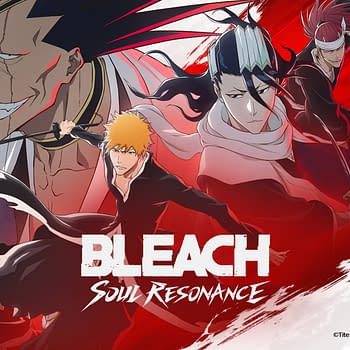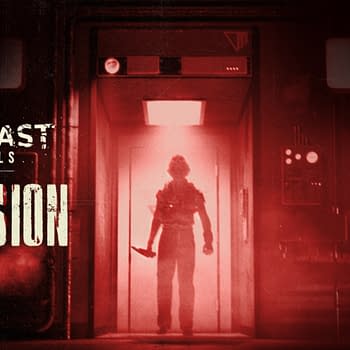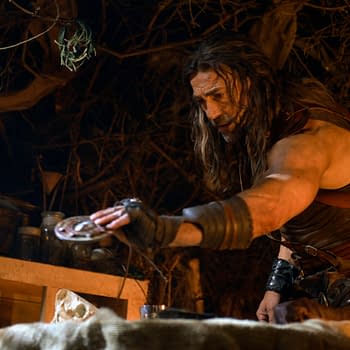Posted in: Games, Movies, Video Games | Tagged: dungeons & dragons, dungeons and dragons, entertainment, gaming, Player's Handbook, Review, rpg, RPG Gaming, Tabletop Gaming, wizards of the coast
A Look At The New Dungeons & Dragons Player's Handbook
By Christopher Helton
The new edition of the Dungeons & Dragons roleplaying game has been rolling out over the last couple of months, first with the release of the Starter Set and now with the first of the core rule books, the Player's Handbook. I have to admit that before the releases started coming out, my enthusiasm for the game had waned. Years ago, I had stopped playing Dungeons & Dragons during the era of the first edition of Advanced Dungeons & Dragons and only came back to the game during the era of the third edition of the game.
I grew up, as a gamer, in an era where D&D was pretty much the only show in town for a long time and when I was finally presented with other roleplaying options during my high school and college years, I moved on without looking back. I looked at some of the early drafts of the playtest edition of the game, then called D&D Next, and it really didn't fill me with enough enthusiasm to spark my interest. One of the biggest problems that Dungeons & Dragons, or any other fantasy tabletop RPG, has to face is that there are so many options out there nowadays. Nearly any preferred fantasy genre or playing style is catered to by some already existing roleplaying game.
I had games like Swords & Wizardry or Castles & Crusades or OpenQuest and I was happy. I didn't need another fantasy roleplaying game. Gaming, in many of the popular game systems, had become a lot more complex than I was interested in. This was what had caused me to move on from the third edition of D&D, and what had kept me from engaging with the fourth edition or games like Pathfinder.
Reading through the new Player's Handbook gave me a feeling towards the game that I haven't had since I picked up the third edition books years ago. I was excited about the game, and even more I wanted to run some Dungeons & Dragons.
I enjoy the more streamlined approach to the game that the designers have put forth in this new edition. There is still a good number of options and complexity (what we call crunch in gaming) to be found in the game. The Player's Handbook offers twelve base classes and nine base races, most likely with more to come in future supplements. They manage to offer up a wealth of options that will keep an experienced gamer engaged, while at the same time presenting the options in a way that will not overwhelm new players and Dungeon Masters. When every new edition of Dungeons & Dragons is someone's introduction to the game, and to roleplaying, it is important to not turn off the new players.
In a way, I think that the Player's Handbook is almost a better introduction to the game than the Starter Set because there is more hand holding for new people in this book than there was in the Starter Set. Despite being packaged as something for people new to Dungeons & Dragons and the hobby of roleplaying, there were still a lot of assumptions that the adventure in the Starter Set would be run by someone with experience with the game. Those assumptions are gone from the Player's Handbook.
All of the character classes have options that allow for individual customization, should players want them. These options are akin to what were once called Kits in the second edition of AD&D. This way you can have two Fighters, or two Magic-Users, in a group and have them look and act different from each other. Instead of playing just a Fighter, you can play a Battle Master, or an Eldritch Knight. This makes for characters that are less generic and allows for ways to tie the basic classes of the core rules into specific settings without having to create more and more classes as you go. Offering the customization options actually cuts down on the amount of things that you have to have later on in the game. For Dungeon Masters this also give relatively simple guidelines for customizing classes for their own campaigns and worlds as well.
Backgrounds give another, optional, method for customizing characters. These backgrounds also give you, as a player, story hooks to help develop your character's story over play. In addition to giving your character bonuses to certain rolls during play, backgrounds also help to fill out their personality with Ideals, Bonds, Flaws and Personality Traits. While you don't have to use backgrounds for your characters, I see it as being popular with players. It also give Dungeon Masters another way to provide custom-built hooks into their own worlds as well.
On the mechanical side of things, one of the things that I like best are the Advantage/Disadvantage rules. For a long time roleplaying games were mired in the idea that there always had to be a significant chance of failure when a character takes an action, that things should be difficult for a character. In some games, I can understand that mindset. Call of Cthluhu, for example, where you play relatively normal individual, should have a significant chance of failure. The thing about D&D, however, is that you are supposed to be playing heroic, larger than life characters. Yes, even with the so-called "zero to hero" approach of character advancement, Dungeons & Dragons characters are still supposed to be above average individuals. With the Advantage/Disadvantage rules the idea that player characters are supposed to be better is brought forward in the rules.
When a character has an advantage in a situation, usually through some special ability given through racial or class traits, the player rolls two twenty sided dice and keeps only the higher of the two rolls, increasing your odds of success. A disadvantage works in the opposite, where you keep the lower of the two rolls in a situation. Inspiration further expands this by giving you a chance during a game session to have an advantage in a roll that you wouldn't normally get. This is for those situations where a character is able to dig deep into themselves and call up reserves that they may not have realized that they have.
Overall, I like the new edition of Dungeons & Dragons. It reverses a trend that made the game less interesting for me, and for the first time since the early days of the third edition I am interested in D&D as a game again. Our weekly group has already been discussing changing over to the new edition once the Monster Manual has rolled out, which will allow me to get a better grip on the game as a Dungeon Master.
Now is a good time to get into the experience of fantasy roleplaying, whether you are new to the hobby or you are a lapsed gamer looking for a way back into the hobby. The Monster Manual and the Dungeons Master's Guide for the new edition of Dungeons & Dragons will be out by the end of the year, and even before the game is all out for us there are a number of people who are already jumping into the new edition. Go out and get your copy of the Player's Handbook today and jump in, like the rest of us.
Christopher Helton is a blogger, podcaster and tabletop RPG publisher who talks about games and other forms of geekery at the long-running Dorkland! blog. He is also the co-publisher at the ENnie Award winning Battlefield Press, Inc. You can find him on Twitter at @dorkland and on G+ at https://plus.google.com/+ChristopherHelton/ where he will talk your ear off about gaming and comics.























